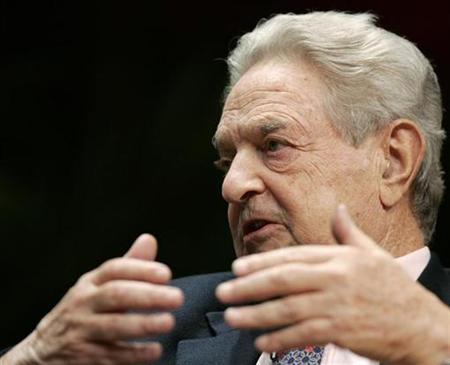One of the world’s leading investors and the man famed for “breaking the Bank of England” in 1992, George Soros, told the World Economic Forum yesterday that the current financial crisis is even worse than what was experienced during the Great Depression of the 1930s. Mr Soros also revealed that he has once again been selling sterling short, though he has now stopped betting against the pound. In a pessimistic tour d’horizon of global prospects, Mr Soros added that he did not think that America would return to robust 3 per cent growth for a decade.
While he had not seen events such as the collapse of Lehman Brothers coming, Mr Soros did say he had in recent months been ready for the fall in the pound, and had profited from it once again. “I did actually have a short position in sterling and it was one of the trades I carried out,” he said. “But sterling did fall from around $2 to about $1.40, and at that level the risk-reward balance is no longer clear. I’m not saying it won’t fall any more though. It will continue to fluctuate.”
Mr Soros said he was now neither a bull nor a bear on the pound. However he reassured listeners that he had managed to “protect my capital and get a rate of return satisfactory in normal times”. His Quantum Fund legendarily made $1bn (£703m) out of the UK taxpayer before sterling was forced out of the European Exchange Rate Mechanism in 1992. Mr Soros’s business partner from those days, Jim Rogers, recently declared that the UK was “finished”.
The euro, said Mr Soros, was also subject to “structural weaknesses” in its constitution, because of the way some governments would be unable to follow through on their guarantees to their banking systems – thus creating differentials between the rates of return on relatively safe German Bunds and, say, Italian debt. “There has to be agreement at EU level on spreading risk. Germany has been reluctant to reach into her deep pockets for countries like Italy,” Mr Soros added.
These views were echoed by Dominique Strauss-Kahn, managing director of the International Monetary Fund, who said: “The eurozone needs more cooperation on economic policy. Otherwise, differences between states will become too big and the stability of the currency zone is in danger.”
The dangers to the euro from its weaker members and from the “peripheral” nations which are aspiring to full membership in eastern Europe were highlighted by Mr Soros.
Looking to the wider financial scene, Mr Soros warned: “The scale of the problem is actually significantly greater than the 1930s… I regard the collapse that followed the Lehman Brothers closure to be the equivalent of what happened in the 1930s when the banking system collapsed.”
He pointed to the scale of debts in relation to the US economy – proportionately twice as big as in the 1930s – and predicted that the finance sector would shrink by a half. The authorities ought to create money both domestically and internationally, through massive expansion in the IMF’s Special Drawing Rights scheme, running to trillions of dollars, Mr Soros suggested.
He also floated the idea of creating a “good bank” rather than the currently fashionable “bad bank”. The good debts of the commercial banks would be taken away rather than the “toxic” ones, though that would mean, acknowledged Mr Soros, that shareholders in institutions such as Citigroup would be “wiped out”. He described America’s banks as being on “artificial life support” and the US economy as condemned to “bumping along” until the Obama administration finds the political will to take more radical actions.
By Sean O’Grady, Economics Editor, in Davos
Thursday, 29 January 2009
Source: The Independent
